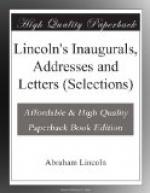In this first address we find no loose use of words. The character of the address does not of course admit of ornament or figurative language, but any subject, however simple, admits of digressions and mental excursions by the illogical and careless writer. Of these there is not a trace. Even in the most informal letters and telegrams, written at post haste and at times under the most extreme pressure of business and anxiety, Lincoln shows a natural feeling for the appropriate expression that is found only in the masters of language.
Five years later, in 1837, the interval being represented by only a few unimportant letters, Lincoln entered upon a period distinguished by qualities that are not usually associated with his name, a tendency to fine writing that we should look for earlier than at the age of twenty-eight. The subject of the address is “The Perpetuation of our Political Institutions,” and the complete text is given in this volume. Here for once Lincoln speaks of an Alexander, a Buonoparte, a Washington. The influence of Webster is apparent, in this first purely oratorical attempt of Lincoln’s. It could hardly have been otherwise at a time when the great Whig orator was making the whole country ring with his wonderful speeches. It is almost certain, too, that Henry Clay, to whom Lincoln later referred as beau ideal of an orator, had a part in moulding this early manner, though this is probably less apparent here than in the later soberer addresses.
But it must not be supposed that this speech consists merely of what Hamlet would call “words, words, words.” Neither are all the figures inferior and commonplace. Although it is more ornate than anything in the later period, the following description of the passing away of the heroes of the Revolution is a fine example of the Websterian style: “They were a forest of giant oaks; but the all-resistless hurricane has swept over them, and left only here and there a lonely trunk, despoiled of its verdure, shorn of its foliage, unshading and unshaded, to murmur in a few more ruder storms, then to sink and be no more.” The closing sentence of the address is almost wholly, in the later style and might have served for the close of the First Inaugural, which, in its original form, did actually contain a Biblical quotation.
That the rhetorical manner had not gained entire possession of Lincoln at that time, but was simply used by him on what seemed to be appropriate occasions, is sufficiently shown by a speech delivered in the legislature early in 1839, in which we find the strictly logical discussion of the first address. This speech is especially interesting because of the fact that it is the earliest encounter of Lincoln and Douglas that has been preserved. In a way, therefore, it may be regarded as the first Lincoln-Douglas debate.




